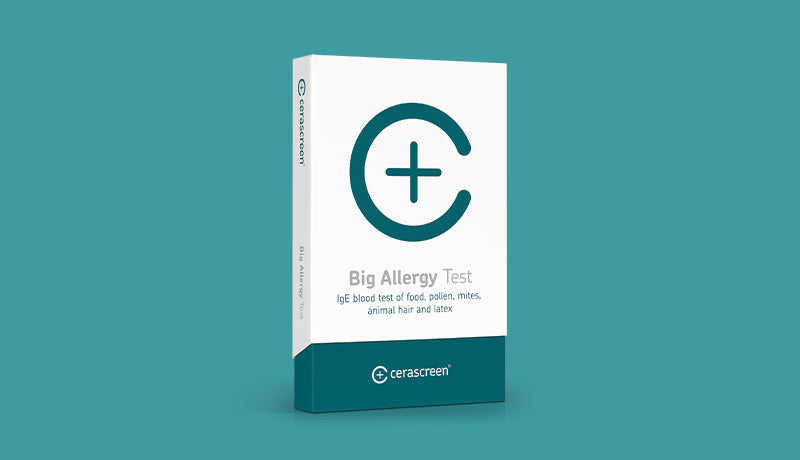Why take the Nut Allergy Test?
A nut allergy is one of the most common allergies in the United Kingdom, with around two percent in both the child and adult population being allergic to nuts. The number of people with a nut allergy nationwide is on the rise.
This type of allergy is also one of the most severe food allergies and can develop from a very young age. Unlike other food allergies that can disappear with age, such as egg allergy, someone with a nut allergy is unlikely to get rid of their allergy as an adult. An allergic reaction to nuts is unpredictable and dangerous, and some people can be more sensitive to the presence of nuts in foods than others.
It is therefore worthwhile screening for a nut allergy if you have your suspicions about an allergy. With the Nut Allergy Test from cerascreen®, you can confirm sensitivity to nuts – from home, anonymously and without waiting at the doctor’s surgery.
Who should take the Nut Allergy Test?
If atopy – that is, the group of conditions such as hay fever, asthma and eczema – runs in your family, you are at a higher risk of developing a nut allergy.
People with a confirmed peanut allergy are more likely to develop a tree nut allergy, as similar proteins are present in both of these types of nuts. People with a tree nut allergy are also more at risk of a sesame allergy, so if you confirm an allergy to certain nuts, you may be able to identify possible cross-allergies to other foods.
How does the Nut Allergy Test work?
The Nut Allergy is a health test that you can easily do at home. The test kit comes with a lancet that you use to take a few drops of blood from your fingertip; you then collect this blood on a dried blood spot card. Afterwards, you then send your blood sample to our specialist laboratory, which analyses your blood for specific IgE antibodies.Once the analysis is complete, you will be notified to check your personal results report in your account if you log in on our website or in the My cerascreen app.
Please note that the most meaningful results will only be obtained if you have had regular contact with the allergen in the two weeks or so prior to sampling. Some medications, for example antihistamines, can also influence the result.
How long does the analysis take in the laboratory?
Once your sample has arrived at the laboratory, it will be analyzed there by specialists. How long the analysis takes depends on the exact measuring method and the processes in the laboratory.
If the sample is sent on the correct days (Sunday to Tuesday), this makes it easier for the laboratory to adhere to the times.
For the Nut Allergy Test, the laboratory analysis is usually completed within 5 working days after the sample is received in the laboratory.
What does the results report tell me?
An allergy test will tell you if you are sensitised to tree nuts or peanuts and how severe it is. Sensitisation means that your immune system produces more IgE antibodies against the allergens in the food.Sensitisation does not automatically mean that you have an allergy. However, if you also experience symptoms after eating certain nuts, you can assume that you have an allergy.
Which foods contain nuts?
If you have a nut allergy, you should avoid consuming nuts at all costs. Unfortunately, nuts are often hidden in certain processed foods and especially in certain cuisines, such as Chinese, Thai and Indonesian foods.
Make sure you check food labels and inquire about ingredients when you eat out. Examples of foods that may contain nuts include biscuits, cakes, pastries, desserts, ice cream, cereal and salad dressings.
What are the different nut allergies?
There are a few different types of nut allergy. One of the most common nut allergies is tree nut allergy. Someone with a tree nut allergy will be allergic to eight different types of nuts: almonds, Brazil nuts, cashews, hazelnuts, macadamia, pecan, pistachios, walnuts, shea nuts.
Another common nut allergy is a peanut allergy triggered by the protein found in peanuts. As peanuts are considered a legume, they are different to tree nuts. If you are allergic to peanuts, you may also be allergic to foods containing similar proteins, such as lupin or sesame.
Who should NOT take the Nut Allergy Test?
The Nut Allergy Test is not or only partially suitable for certain groups of people:
People with infectious diseases, like hepatitis and HIV, may not use the Nut Allergy Test.
People with haemophilia should not take the test.
Pregnant and breastfeeding women should only take the Nut Allergy Test under medical supervision. The given reference ranges and recommendations do not apply to people in this group; consult your medical professional for advice concerning your test results.
The Nut Allergy Test is not intended for children under 18 years of age.
The test is not intended for diagnosing illnesses or disease. For example, if you suffer from physical pain, consult a doctor.
Why are children under 18 not allowed to take the test?
Our tests are not suitable for underage children and adolescents under the age of 18. Under 18s cannot activate the tests online and therefore cannot receive a test result. We ask that you do not administer the tests to your children either.
Children and adolescents need much closer supervision and counselling regarding medical tests and their interpretation. Testing with lancets and chemicals is not without risk and would need to be closely supervised by guardians. In addition, the reference values we give are always based on adult data. In the case of children, the risk of misinterpreting the results would be very high.
We want to fulfil our responsibility as a provider of medical products and ensure that children and adolescents are not unsettled by measurement results that are difficult for them to interpret. Since we cannot control whether the minors' legal guardians actually consent to the test being carried out and supervise them, we exclude tests for under 18s altogether.
If you are under 18 and have purchased a test, please contact our customer support.
Why does it take up to a week for the sample to reach the lab?
Please bear in mind that your results will not be analyzed in the UK but in Germany. For that reason, it can take up to a week for the sample to arrive at the lab. This does not affect the stability of the samples, as the method we are using is optimized for long transports.
Initially, your sample is sent to our collection center in the UK. From there, it is shipped to our central sample sorting facility in Germany, which then distributes samples to our partner laboratories. Once your sample is analyzed there, you will receive a notification and can access your result online.
Please check your mailbox regularly. We will notify you as soon as your sample is sent, arrives, or is analyzed.
Why does the test have an expiration date?
The cerascreen® test kits are CE-marked medical devices, which in turn include other certified medical components such as lancets, patches, and alcohol swabs used in blood tests.
Like most medical devices, these components have an expiration date to ensure that they remain safe and effective. Many of our sample carriers – such as dried blood cards or sample tubes – are chemically treated to keep your sample stable and analyzable in our laboratory. Over time, environmental factors can affect this treatment and compromise accuracy.
Our sterile, single-use lancets also carry an expiration date to guarantee sterility and safe use up to that time.











